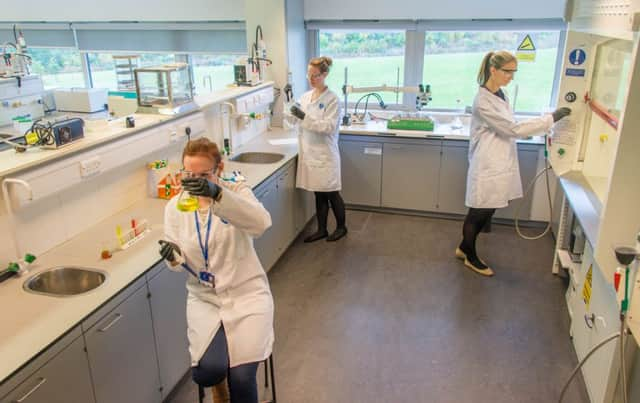Art and science of food and drink


Today marks the formal opening of the first Scottish Centre for Food Development and Innovation based at Queen Margaret University, Edinburgh. It is a milestone for Scotland’s booming food and drink industry which is worth around £14 billion each year to the Scottish economy and has been hailed by the Scottish Government as a national priority and key area for growth. Although progress has been substantial, and the future is bright, there is still more that could be done to optimise collaboration between academics and businesses in support of Scotland’s economic aspirations.
Food and drink is the largest manufacturing sector in Scotland, employing around 50,000 people, and has an industry strategy that is a blueprint for innovation. However, as a sector, it is not yet represented in the Scottish Government’s flagship portfolio of Innovation Centres; the highly regarded “triple helix” collaboration of universities, businesses and Government – and recognised internationally as key to stimulating innovation and driving a knowledge economy.
Advertisement
Hide AdAdvertisement
Hide AdThe significance and growth of the sector presents some transformational opportunities for an innovation infrastructure to support its potential by aligning industry requirements with the many disparate strands of excellent research currently ongoing in universities across the country.
The newly launched Scottish Centre for Food Development and Innovation has been established at QMU in response to demand from Scotland’s SMEs for combined research and innovation space to support the food and drink sector in accessing export markets in the rapidly expanding global functional and healthy food sector. The centre offers excellent facilities, including a fully equipped sensory suite, dedicated microbiology and chemistry laboratories, a white room to test new technology and a development kitchen. QMU is working with individual businesses and special interest groups to address issues in food security, quality, processing and waste management.
Our academics are already helping Scottish businesses reach global markets, and we will be able to draw on broader expertise in health and rehabilitation across the university to add value to our work connecting food and health. It is a good start.
But project funding provides limited support for the underpinning market-ready research which the centre provides. Such research is easily and quickly adapted by industry, and could propel Scottish food and drink producers to the forefront of the global industry. Making it easier for businesses to access the knowledge and support they need to develop their products and processes through a single point of contact can only be good news for the sector. It opens up funding opportunities, useful networks and widens prospects for collaboration.
To supplement our fully serviced innovation space for food testing and development, the next step is to provide the physical environment needed for fledgling and existing businesses to develop and trial new concepts from incubation through to pilot testing and factory production. There is a significant gap in the provision of such facilities in Scotland, and companies currently have to look beyond our borders to access them.
Speed is important in a competitive market and proximity to a university with a strong knowledge exchange programme allows companies to use shared lab facilities and easily access expertise in science, health, nutrition and commerce. Strong infrastructure, good transport links and same-site office, pilot and factory scale facilities would allow businesses to grow seamlessly, providing continuity and stable local employment. To achieve this would require a visionary partnership between local authority, Scottish Government, landowners and the community.
Today’s launch event represents a step-change in the relationship between academia and industry and will celebrate knowledge exchange successes so far. Food producers will be showcasing their products along with companies that have benefitted from working closely with the university. Amongst those setting out their stalls will be Stirling-based iQ Chocolate, Gusto artisan dressings, marinades and oil and vinegars from Leith; East Lothian-based Black & Gold rapeseed oil; Edinburgh’s leaf tea experts, eteaket; Cuddybridge fruit juices from the Scottish Borders, and The Chocolate Tree chocolatier, also from East Lothian.
The future potential of these companies is considerable. The full potential of Scotland’s food and drink industry will only be unlocked if sufficient funding, facilities and support are available to allow the sector space to collaborate, innovate, think and rethink the future of their products and processes.
• Dr Fiona Coutts is Dean of the School of Health Sciences at Queen Margaret University, home of the Scottish Centre for Food Development and Innovation www.qmu.ac.uk